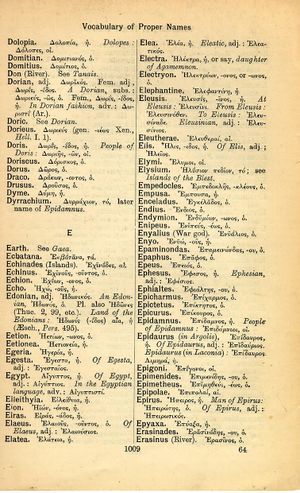Epigoni: Difference between revisions
αἰτῶ δ' ὑγίειαν πρῶτον, εἶτ' εὐπραξίαν, τρίτον δὲ χαίρειν, εἶτ' ὀφείλειν μηδενί → first health, good fortune next, and third rejoicing; last, to owe nought to any man
m (Text replacement - "}}]]" to "}}]]") |
m (Text replacement - "(|thumb)\n(\|link=)" to "$1$2") |
||
| Line 1: | Line 1: | ||
{{WoodhouseENELnames | {{WoodhouseENELnames | ||
|Text=[[File:woodhouse_1009.jpg|thumb | |Text=[[File:woodhouse_1009.jpg|thumb|link={{filepath:woodhouse_1009.jpg}}]]Ἐπίγονοι, οἱ. | ||
|link={{filepath:woodhouse_1009.jpg}}]]Ἐπίγονοι, οἱ. | |||
}} | }} | ||
{{Lewis | {{Lewis | ||
Revision as of 17:00, 18 May 2020
English > Greek (Woodhouse)
Ἐπίγονοι, οἱ.
Latin > English (Lewis & Short)
Ĕpĭgŏni: ōrum, m., = Ἐπίγονοι,
I the After-born.
I The sons of the seven heroes who went together against Thebes, Hyg. Fab. 71; as the name of a tragedy of Aeschylus, translated into Latin by Attius, Cic. Opt. Gen. 6, 18; id. Tusc. 2, 25, 60; id. Off. 1, 31, 114.—
II The children of the soldiers of Alexander the Great by Asiatic women, Just. 12, 4 fin.>
Latin > French (Gaffiot 2016)
Ĕpĭgŏnī,¹⁶ ōrum, m. (Ἐπίγονοι), Épigones [descendants des sept héros grecs qui dirigèrent la première expédition contre Thèbes et y périrent ; titre d’une tragédie d’Eschyle traduite en latin par Accius : Cic. Opt. 18 || nom donné aux enfants des soldats d’Alexandre mariés en Asie : Just. 12, 4, 11.
Latin > German (Georges)
Epigonī, ōrum, m. (επίγονοι), die Nachkommen, von den nachgebliebenen Söhnen der sieben gegen Theben vereinigten u. vor dieser Stadt gefallenen Fürsten, welche zehn Jahre darauf den Krieg erneuerten, Hyg. fab. 71. – dah. Name einer Tragödie des Äschylus, Cic. Tusc. 2, 60, die Accius zu einer gleichn. latein. benutzte, Cic. de off. 1, 114; de opt. gen. 18.

